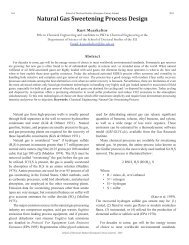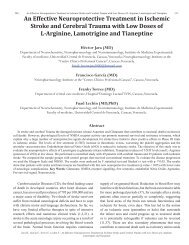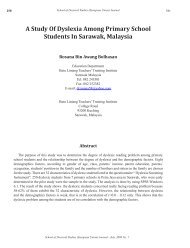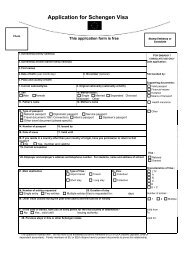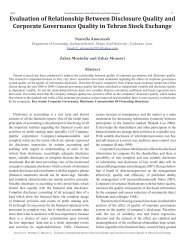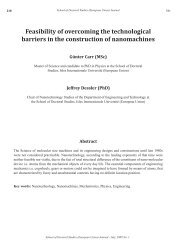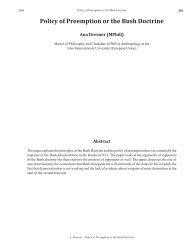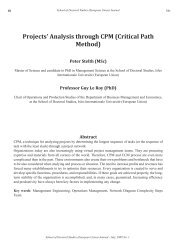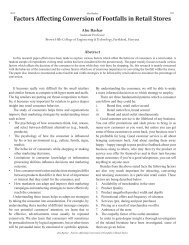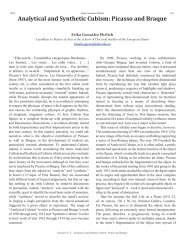Iiuedu.eu
Iiuedu.eu
Iiuedu.eu
You also want an ePaper? Increase the reach of your titles
YUMPU automatically turns print PDFs into web optimized ePapers that Google loves.
Empirical Evaluation of the Evidence of the Beneficial Influence of the Strategic Planning Process on the Overall Performance of Emerging2011 Countries Companies13process, despite the performance achieved. Strategiesformulation comes in practice more from deliberate process,than the emerging and adaptive process supported by HenryMintzberg. Similarly, the responses lead to concludingdysfunctions caused by strategic planning as little or notpresent. Few studies in this category, however, develop animpact of strategic planning with the long or short term.Studies Identifying Dysfunctions AssociatedWith Strategic PlanningIn their 1983 study, Bresser and Bishop [13] arguethat explicit strategic planning can be dysfunctional if itintroduces rigidity and encourages excessive bureaucracy.In these cases the planning results in rigidity and inflexibilityof responses to the changing environment in emergingcountries. Strategic planning tends to increase the need forcoordination and control of the process of forming strategies,usually fluid, flexible and informal. The process tends tohalt the creative thinking and promote the maintenanceof old patterns or models that have proved successful. Inother words, in order to maintain some control, strategicplanning tends to be an exaggerated extrapolation of pastand present, in the future, rather than seeking to reinventthe future. Policy makers usually assume that the future isa linear progression from the past. They set the strategiestaking into account a future more or less corresponding towhat one knows, or some development allowed. Strategicplanning creates the illusion of certainty in a world ofuncertainty, risk and constant change, without taking intoaccount the contingencies of the environment. In relativelysafe environments, free from control systems and counterdemocratic power allowing play of market forces, or in caseof monopolies or duopolies (like the field of manufactureof civil aircraft dominated globally by Airbus and Boeingcompanies), this illusion doesn’t pose any problems. Wenote thus a lack of application of processes in emergingcountries companies. In addition to the challenges posedby the involvement of human resources, communicationand dissemination of a common culture of these companiesand the adaptation of organizational structure, the lackof flexibility in the planning and the limited vision of thefuture that it implies prevent the efficient implementationof the strategies it has itself helped develop. These, whenimplemented, are sometimes inadequate and lead tounexpected results. Strategic planning is currently unableto take into account the range of possible futures, andtherefore doesn’t allow establishing a certain plan for thelong term.Lesson 2Studies based on an assessment of the strategic planningprocess, while taking more account of the nature of strategicplanning, and the nature of the consequences of planningwithin emerging countries organizations, also come tomixed results. They confirm the existence of a link betweenstrategic planning and business success, but does notspecify whether or not a relationship of cause and effect.Strategic planning, when adequately used, is associatedwith non-economic benefits that can confer or enhancethe competitive advantage of a firm, but it sometimesleads to dysfunctions (including inflexibility and rigidity)that can limit these organizations in their expansionand development. It is thus clear from these studies thatstrategic planning is a complex tool that cuts both ways,whose effective use is not granted.The main criticism that can be made to modelsmeasuring the characteristics of the system to evaluate itseffectiveness rests once again in the methodology. Mainlybased on mailed questionnaires in view of the nature ofresearch, these studies don’t record spontaneous answers ofrespondents, and obtain relatively low response rate (over600 companies, 207 responded to the study of V. Ramanujamand Venkatraman N, is therefore 34.5% response, and 113out of 500 companies responded to the study of Glaisterand Falshaw, and thus an overall response rate of 23%).The result is a poor sample representation, since, as thedifferent authors note, the majority of responses came fromlarge corporations, or performers of strategic planning. Thesamples are therefore biased in favour of this category ofrespondents.Explanation of Differences BetweenTheoretical Models and Practical ModelsHow to explain the differences between theory andpractice? In other words, how is that, contrary to what isclaimed in the literature, strategic planning doesn’t alwayslead emerging countries companies to success, and issometimes associated with malfunctions? Although someof these companies are favoured by the use of strategicplanning, others do not recognize the benefits. Twocategories of problems related to the concept may explainthese differences.Problems Related to the Nature and Definitionof the ConceptAmedzro W. G. - Empirical Evaluation of the Evidence of the Beneficial Influence of the Strategic Planning Process on the Overall Performance of Emerging CountriesCompanies



